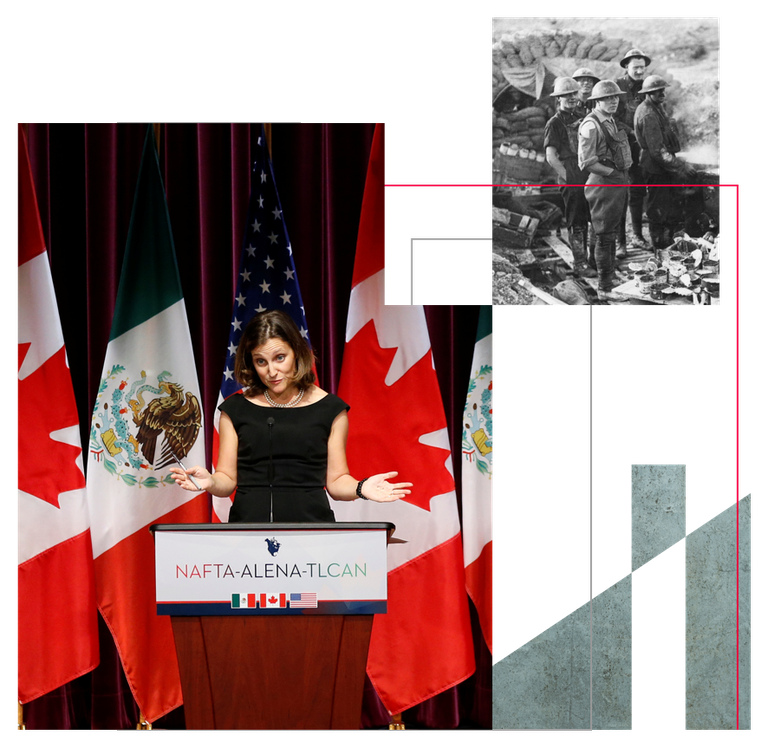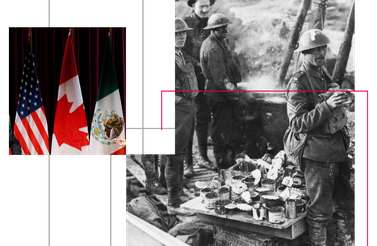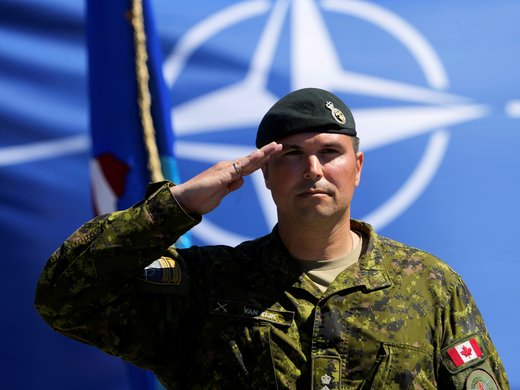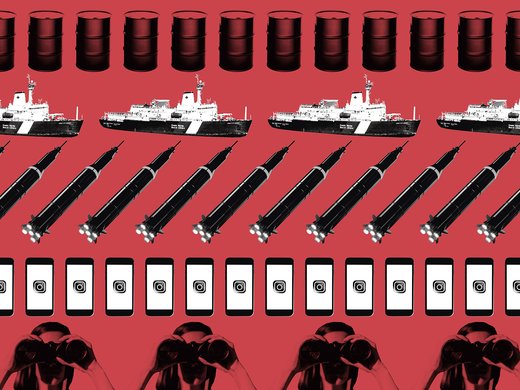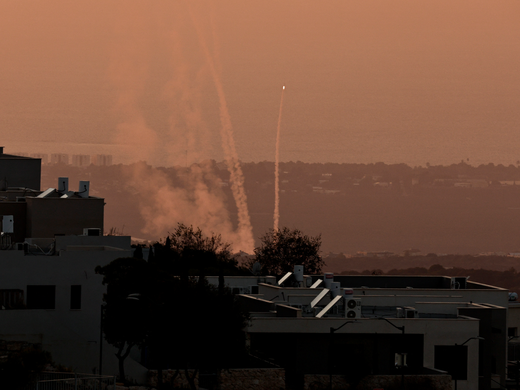Timothy Sayle’s essay ends with a reference to how the dire state of our national archives makes it incredibly difficult to study national security history (Marsden 2021). As a contemporary scholar and practitioner, I must agree. It is similarly challenging to reflect strategically on Canada’s national security today, for two distinct reasons. First, national security cannot be studied as a standalone concept. No analysis in this area can be divorced from a broader discussion of international affairs. Canada projects itself as a multilateralist power, a promoter of alliances. While this internationalist worldview is part of the Canadian ethos, it means that, as a middle-power, Canada is also deeply dependent on alliances. And while Ottawa’s engagement in the world is a strength, Canadian national security is a constant negotiation of that dependency.
The second reason is that contemporary national security challenges are rarely discussed in a non-partisan manner. Sayle argues that “if there is a pattern to Canada’s national security history, it is that, for more than 150 years, the viability and integrity of the state has been preserved first and foremost by ensuring that Canadians remain united.” I agree and, as a result, a fracture in the Canadian public’s unity when it comes to existential threats poses a critical challenge to national security. Consider, for example, the deep partisan fracture over the early 2022 convoy protests and invocation of the Emergencies Act (West, Carvin and Juneau 2022). The establishment of a National Security and Intelligence Committee of Parliamentarians (NSICOP) in 2018 was meant to increase cross-partisan collaboration, but its work was temporarily compromised in the spring of 2021 by a boycott by the official opposition over the government’s refusal to provide Parliament with unredacted documentation regarding the dismissal of scientists from the National Microbiology Lab in Winnipeg in July 2019 (Fife and Chase 2021).
This essay offers paths for reflection on how Canadian national unity and cross-partisan collaboration can be fostered in the area of national security by analyzing two case studies with deep national security and foreign policy implications: Canada’s response to Russia’s seizure of Crimea in 2014 and the renegotiation of the North American Free Trade Agreement (NAFTA) in 2017–2018.
Partisanship and parliamentary debates on national security issues are unavoidable — it is the nature of any strong democracy that opposition parties need to hold the government to account. The absence of debate would be of equal concern to the health of our democracy. At key moments, however, concessions and collaboration must take precedence over partisanship to defend what “aims to protect Canada and its people from major threats that would undermine our democratic institutions and processes, our economy, our social fabric and values, and our interests” (Shull and Wark 2021, 9–10). As Sayle has shown historically, uniting the Canadian public remains a prerequisite for ensuring national security.
Crimea
One of the most striking examples of partisan unity in recent years has been the consistency of Canada’s defence of Ukraine’s sovereignty and tough stance against Russia in response to the 2014 annexation of Crimea. Over the past decade, Russia has increasingly asserted itself as a major military power willing to use hybrid and cyber operations to destabilize its real and perceived rivals. As the Council on Foreign Relations’ special report on Russian containment notes: “The evidence that Russia interfered in the 2016 U.S. Presidential election is overwhelming” (Blackwill and Gordon 2018). Yet a deeply polarized political climate in the United States made recognizing and acting on this interference difficult, just as divisions in much of Europe between Russia hawks and pro-Russia doves have created significant vulnerabilities. Canada is far from immune from the threat of similar interference. Indeed, there have been official reports of efforts to sow disinformation and even to disparage cabinet ministers through state-sponsored media campaigns (Dawood 2021). Nonetheless, consensus among Canada’s leading political parties regarding the threat posed by Russian interference and extraterritorial actions has helped preserve Canadian national security and democracy by reducing the opportunities for political exploitation.
The Canadian consensus might be due to a predominantly realist view of Russia’s global ambitions among national leaders. Political imperatives surely also play a role. The Canadian-Ukrainian population’s advocacy efforts are second to none (Carment and Landry 2016). Moreover, Canada’s economy does not depend on Russian energy imports, a luxury that Canada’s European allies do not enjoy. Geographically, the fact that Canada has only one land neighbour has meant that its foreign policy has been shaped as much by choice as by negotiation.
Consensus among Canada’s leading political parties regarding the threat posed by Russian interference and extraterritorial actions has helped preserve Canadian national security and democracy by reducing the opportunities for political exploitation.
In response to the 2014 annexation, Ottawa announced multiple rounds of sanctions,1 led international campaigns denouncing Russian overt and covert aggression, and collaborated on joint strategies to deter Russian foreign interference and support for dictators such as Syria’s Bashar al-Assad. Diplomatic ties had begun to erode even prior to 2014, with meetings between the two countries’ leaders limited to brief encounters at multilateral fora. Post-2014, however, direct diplomatic exchanges between public servants were limited to specific issues such as the Arctic. In its official communications, Russia lamented the poor state of bilateral relations, blaming Canada, but still expressed a desire for improving diplomatic ties: “Being neighbors across the North Pole and the Pacific Ocean, sharing common passion for hockey, Russia and Canada can and should maintain stable and predictable relations.”2
The broad cross-partisan agreement on Canada’s policy toward Russia in response to the annexation of Crimea did not mean that the question of Ukraine and Russia never featured in Question Period or that it did not engender partisan tension. Before the 2015 federal election, the Liberals challenged the Conservatives’ failure to add to the Canadian sanctions list specific oligarchs involved in the annexation of Crimea (Freeland 2015). They also criticized Conservatives for not including representatives from opposition parties on delegations to Ukraine (National Post 2014). Similarly, Conservatives challenged the Liberals’ unwillingness to transfer lethal aid to Ukraine prior to Russia’s more recent invasion. All of this, however, is minor crossfire on the margins of what remained a broadly cohesive Canadian position, which can be summarized as “Russia is the aggressor, and Ukraine is the victim” (Boissonnault 2022). In the aftermath of the annexation of Crimea, parties agreed on the desired outcome (challenging Russia) even if they at times disagreed on the means.
Canadian intransigence was criticized by some as reflecting a diaspora-driven alignment with Ukraine that resulted in insufficient openness to dialogue with Moscow (Ibbitson 2014). Yet, this uncompromising stance was supported by the Canadian public at large. The vast majority of Canadians agree that Canada should assist Ukraine militarily (Stober 2022). The lack of major partisan battles over the threat posed by Russia since 2014 has decreased the vulnerability of Canadian democracy to the sort of destabilization and interference that the United States has experienced. Political scientist Kenneth A. Schultz (2017) notes that by intervening in the American election in 2016 in a way that benefited the Republican candidate, “the Russians put their thumb on the scales of [the American] partisan divide.” The partisan nature of this attack meant that there was an incentive for Republicans to downplay the seriousness of the threat on American national security. In the Canadian context, there is no partisan cleavage to be exploited.
Free Trade in North America
The negotiation of a new trade agreement between Canada, the United States and Mexico in 2017–2018 came at a time of heightened national anxiety. The interlinkages between trade, economic security and national security are spelled out clearly in the 2010 US National Security Strategy: “Our prosperity serves as a wellspring for our power. It pays for our military, underwrites our diplomacy and development efforts, and serves as a leading source of our influence in the world” (The White House 2010, 9). A volatile economy makes it challenging for a state to fully defend its sovereignty. It can become vulnerable to threats through a dependence on foreign debtors. The strength of the Canadian economy, and of its national security, relies on the reliability of its trading relationship with the United States. Given that around 75 percent of Canadian merchandise exports go south (Jiang 2019), the threat of a major disturbance to North American trade quickly seized the attention of Canadians and their leaders.
A reliable, predictable and well-functioning free-trade agreement with the United States enables the Canada-US alliance to remain one of the strongest in the world. Embedded within the trilateral free-trade regime are joint supply chains in the automotive, defence and aerospace manufacturing industries, among others. A degradation in Canada-US trade relations would have had a direct impact across the Canadian national security ecosystem: the movement of people, joint defence industry, intelligence sharing, joint operations, technology and talent sharing. A permanent deterioration of trading conditions with the United States would have had a profound negative impact on the Canadian economy and forced the government to quickly diversify to new markets, potentially resulting in deeper trade relations with countries that are less aligned with Canadian interests and values. Navigating how and whether to trade with such countries is no longer just a theoretical exercise; it has arguably become the central national security debate in recent years (especially with regard to China).
Overall, the renegotiation process with the United States and Mexico was characterized by a remarkable level of national unity and cross-party cooperation. One key ingredient was the government’s proactive creation of the NAFTA Council,3 which included heavyweight opposition representatives such as recent interim Conservative leader Rona Ambrose, former Conservative Minister of Industry James Moore, former senior NDP representatives, as well as business and union leaders. The composition of the council suggested a deliberate strategy to promote cross-party unity. What’s more, partisan alignment was enhanced by the parties’ agreement both on the desired outcome as well as the general means of achieving it.
Another key factor that can explain the relative lack of partisan strife during the negotiations of the free-trade agreement was the involvement of opposition MPs, premiers and important stakeholders of all stripes in the coordinated joint outreach to American stakeholders at all levels of government and with businesses and unions: a “Team Canada” approach. When it comes to the US relationship, Canadians don’t have to depend on embassies and formal diplomatic channels — everyone can be deployed to influence their own universe. If the interests of political actors are generally aligned — as in the case of the NAFTA renegotiation — this productive approach reinforces Canada’s position. In September 2017, a delegation made of MPs from all parties met with members of the US House of Representatives in Washington, DC, to advocate the importance of maintaining robust free trade in North America (Parliament of Canada 2017). Conservative premiers also travelled to Washington in February 2019 to attend the National Governors Association meeting and lobby on Canada’s behalf (Canada’s Premiers 2019). The renegotiation of NAFTA is an example of politics stopping at water’s edge, indeed even kilometres before the edge. This unlikely cross-party alignment (given the previous controversies over the original NAFTA and even the Canadian-European Union Comprehensive Economic and Trade Agreement) enabled a more cohesive national security position for Canada.
Conclusion
Fostering national unity requires active engagement of the opposition: structures that give opposition MPs, provincial politicians and stakeholders a meaningful role in the diplomatic process. All of these political actors can use their involvement to demonstrate their authority and influence — which can be uncomfortable politically for the government. Nonetheless, their engagement is critical.
This reflection focused on two case studies where low partisan polarization enabled enhanced national security. Yet there are many examples where polarization prevailed. The temporary boycott of NSICOP is a tale of partisan quarrelling leading to a missed opportunity to reinforce Canada’s national security. The now-defunct parliamentary committee on Canada-China relations was a hotbed of partisan struggle that undermined Canada’s ability to present a joint front vis-à-vis an increasingly assertive China. Could these bodies have turned out differently? While partisanship cannot be eliminated (nor should it be), Canada can reinforce specific mechanisms to improve trust in its national security processes — both by parliamentarians and by the general public. NSICOP’s role and peculiar structure should be maintained. Its innovative reporting structure to the executive, with its own secretariat, unique even among Westminster systems, was designed to enhance collaboration among parliamentarians. The legislation underpinning NSICOP, due to be reviewed in 2022, should be updated to ensure the independence of the committee’s investigations and reports (Shull and Wark 2021), while keeping the public reports it publishes unclassified.
Different strategies should also be explored to test whether cultural change can be fostered among parties on issues of national security. Institutional mechanisms with a review function, such as NSICOP, are important and represent a viable attempt to include parliamentarians in the review of and communication about national security, but their mandate is too focused on process without any broader discussion on the strategic objectives the committee seeks to achieve. One potential initiative is holding a regular structured meeting on national security at the launch of each parliamentary session between the prime minister and the leaders of the opposition parties to frame the work of NSICOP. The discussion could be largely off the record, followed by an agreed-upon public statement, which would encourage the leaders to find common ground and articulate joint national security objectives. Former Secretary of State for External Affairs Louis St. Laurent warned in his 1947 Gray Lecture that “our external policies shall not destroy our unity” (St. Laurent 1947). Today, this maxim must be turned on its head. Instead, we ensure that our national discord shall not destroy our external policies.
